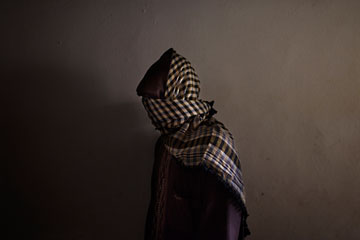
A member of Boko Haram, in a suburb of Kano, Feb. 12 2012.
(3 of 3)
One victim of the military campaign is a 33-year-old mechanic with patient eyes and grease-stained hands, who asked to be identified only by the name Baba, for fear of retaliation. A Muslim member of the Hausa ethnic group, Baba grew up in Maiduguri. He was working in his garage, a breezy lot covered in brown dirt and filled with sedans, on a Friday morning last December when government troops drove up in an armored vehicle and cordoned off the area. They then rounded up at least 30 men, including Baba. The soldiers accused them of being members of Boko Haram and beat them with the sticks to the point that Baba fainted. He denied, as he does now, having any links to the group: "I am not Boko Haram. I don't have any friends who are Boko Haram." Baba and six others were packed in the armored vehicle and moved to a barracks. There the soldiers tied the men to pillars, stripped them of their clothes and held burning strips of leather over their bodies, Baba recalls. It was the cold season, and freezing water was poured on them. "Tell us the truth," the soldiers said. By Tuesday evening, only Baba was still alive.
He says he was then moved to a cramped space where nearly 800 people, some as young as 12 and others older than 65, were handcuffed together. Fed only handfuls of food and regularly beaten, "we found dead bodies among us daily," he says, standing near the garage where he has gone back to work. He was in detention for 45 days, let out only because he had friends working for the police and state security. One of his grease-covered hands does not close; the thumb on that hand is gnarled, and it is covered with a gaping, raw pink-yellow wound. "I thought I would die before I was released," he says. "Once they dump you there, they forget about you."
The experience has soured Baba on helping the army. "The military has not made anything better," he says. "If I had information about Boko Haram, I could not tell the military because I do not trust them."
Femi Adefila, special assistant to the Minister of State for Defense, denies that the military commits abuses of the sort described by Baba. "Nobody can be summarily arrested and executed," he says. "No, that does not happen. People can definitely be questioned and detained." But the allegations in the past months have mounted. At Maiduguri Teaching Hospital, medical workers say the bodies of militants the military was leaving there last year and earlier this year often showed signs of beating, bruising from shackles and cigarette burns — possible signs that the men were killed after being captured and tortured. Babangida Labaran Usman, of Nigeria's National Human Rights Commission, estimates that the military has detained more than 7,000 people since 2011 at Maiduguri's Giwa Barracks. He has a thick book of the biographical details and photos of missing boys and men, who are of the mostly Muslim Kanuri and Hausa ethnic groups. Despite Usman's efforts to follow up with the military, "I can't tell you whether these boys are alive or dead," he says.
A Pyrrhic Victory?
The whereabouts of Shekau and the other top leaders of Boko Haram are unknown; they could be hiding in Nigeria, or they could now be based in a neighboring country. The military seems content with the idea that some Boko Haram members are no longer on Nigerian soil. "Our business is to clear the nation of insurgents. If they choose to relocate elsewhere, unfortunately that will not be our business," said Olukolade, the military spokesman.
Not immediately, perhaps, but analysts say the Islamist group's time in exile may not last. "Boko Haram may just take a little time to regroup, perhaps do a bit of recruiting and ask their al-Qaeda sympathizers for help, and plan a comeback for a later stage," says Virginia Comolli, research associate for transnational threats at the International Institute for Strategic Studies in London. "Some Boko Haram members have trained in al-Qaeda and [Somali militant] al-Shabab camps and received weapons and money from them." Last year a Boko Haram splinter group calling itself Ansaru began kidnapping Westerners in Nigeria and Cameroon.
Some Boko Haram members have fled to other parts of Nigeria. On July 29 several bombs exploded in Kano, the largest city in the north, killing at least 24. And on July 30 a military spokesman announced the arrest of 42 suspected Boko Haram members in the country's largest city, Lagos, and in a neighboring state in the southwest of the country. "Their camps have been detonated in the east, so they're running down south," says Adefila.
Comolli and other analysts and policymakers say in the long term, the military campaign against Boko Haram will not be enough to solve the problem of militancy. "The most sustainable way to advance long-term peace and security is through peaceful resolution, coupled with massive job creation to fight the youth's restiveness and poverty," Isa Umar Gusau, adviser to Maiduguri Governor Kashim Shettima, tells TIME.
For now, the fighting has only further impoverished the north, Nigeria's poorest region, driving many businesses southward and sending food prices skyrocketing. Up to 40% of Maiduguri's population has left the city since 2009; entire sections have been reduced to rubble. Numerous road-construction projects sit abandoned, giving the city a postapocalyptic feel. Soldiers stand at fortified checkpoints, guns pointed at oncoming traffic. There has been a drop in the violence in Maiduguri, but as Boko Haram continues its bombings and shootings elsewhere in the country, the Nigerian military may be facing a new reality: a once localized conflict spreading all over the most populous country in Africa.
— with reporting by Katie Harris and Qhelile Nyathi / London
